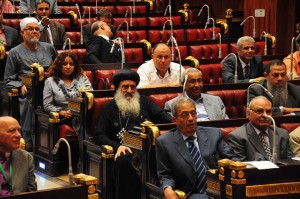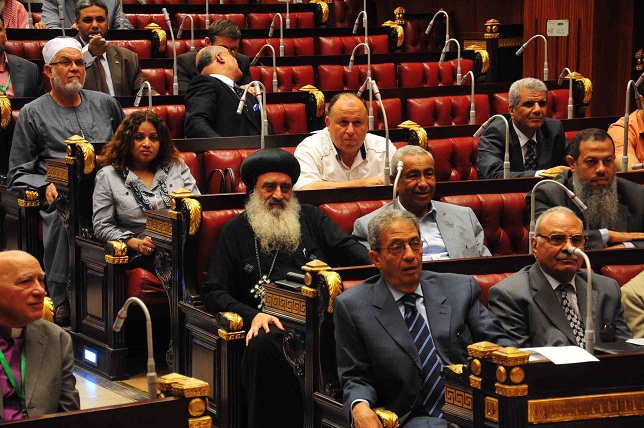
The Constituent Assembly tasked with drafting Egypt’s constitution postponed holding elections to select replacement for six members who resigned last week, as well as to discuss its specialised committees’ reports in their session on Tuesday.
Several members called for postponing the process. Nubian rights activist Manal El-Tiaby said it would be unfair to elect new members from the assembly’s reserve list as the candidates were all still unknown.
Former Arab League Secretary General Amr Moussa called for a cancelation of elections and instead suggested that in addition to being chosen by consensus the new members include at least three Coptic Christians and two non-Islamist members in order to increase the assembly’s diversity.
Constituent Assembly Chairman Hossam El-Gheriany said that would not be possible, however, as the assembly’s bylaws stipulate that replacement members must be chosen from the same entity the outgoing member was representing.
Ghad Al-Thawra Party leader Ayman Nour suggested postponing the election until all members who resigned from the assembly provided written statements that they no longer wish to be involved in order to avoid any further legal challenges that have plagued the Assembly until now.
In addition to the election issue the assembly heard reports from its specialised committees including the Defence and National Security sub-committee of the System of Governance Committee which is currently debating the nature of the president as Supreme Commander of the Armed Forces while the minister of defence will be the Commander-in-Chief of the Armed Forces.
The military submitted its own suggestions regarding their status in the new constitution and the sub-committee is yet to discuss them.
The Executive and Legislative Branches sub-committee of the System of Governance Committee reported that it was leaning towards a mixed semi-presidential system like that of France where the president and the prime minister have distinct roles and powers.
However, the committee said it received advice from a Portuguese constitutional researcher that such a system would fail and that a parliamentary system would work better. The committee is working on bringing the researcher over to Egypt to give the assembly a lecture.
The Rights and Freedoms Committee reported that in its two meetings over the last week it has drafted three new articles regarding the right to health, work and private ownership.
The healthcare article will include the right to healthcare regardless of financial status and free healthcare in case of emergencies while the right to private ownership will guarantee that the state cannot confiscate private land without judicial approval in order to avoid recreating past land-related corruption.
The right to work article will include an obligatory minimum and maximum wage in the public sector.
The committee has three more articles to discuss regarding women, children and families as well as the general articles regarding rights and freedoms before completing its work. It envisions being done next week.
The drafting committee, responsible for the language of the new constitution has said it will be meeting twice a day daily and is currently working on drafting a preamble to the constitution until the specialised committees complete their recommendations for articles.
The Assembly will be meeting again next week on Tuesday to discuss the reports of specialised committees and possibly vote in replacement members.

